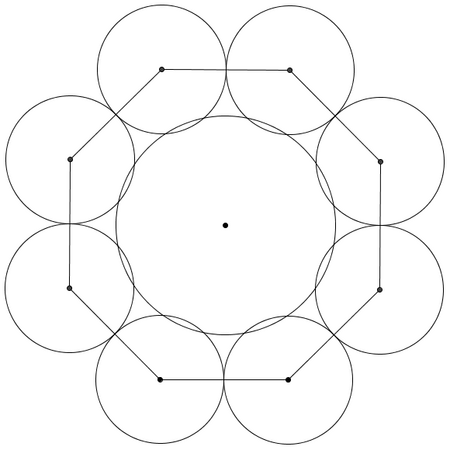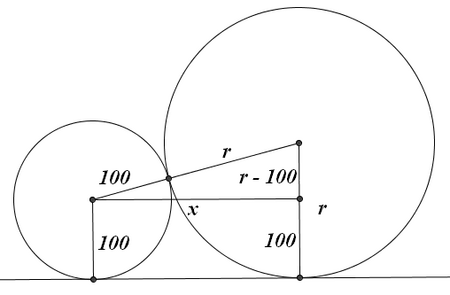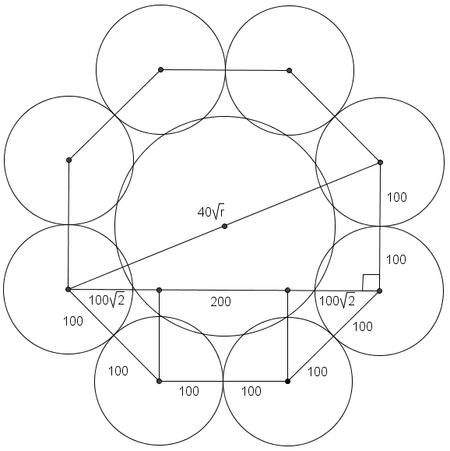1998 AIME Problems/Problem 10
Problem
Eight spheres of radius 100 are placed on a flat surface so that each sphere is tangent to two others and their centers are the vertices of a regular octagon. A ninth sphere is placed on the flat surface so that it is tangent to each of the other eight spheres. The radius of this last sphere is ![]() where
where ![]() and
and ![]() are positive integers, and
are positive integers, and ![]() is not divisible by the square of any prime. Find
is not divisible by the square of any prime. Find ![]() .
.
Contents
[hide]Solution 1
The key is to realize the significance that the figures are spheres, not circles. The 2D analogue of the diagram onto the flat surface will not contain 8 circles tangent to a ninth one; instead the circles will overlap since the middle sphere has a larger radius and will sort of “bulge” out.
Let us examine the relation between one of the outside 8 spheres and the center one (with radius ![]() ):
):
If we draw the segment containing the centers and the radii perpendicular to the flat surface, we get a trapezoid; if we draw the segment parallel to the surface that connects the center of the smaller sphere to the radii of the larger, we get a right triangle. Call that segment ![]() . Then by the Pythagorean Theorem:
. Then by the Pythagorean Theorem:
![]()
![]() is the distance from one of the vertices of the octagon to the center, so the diagonal of the octagon is of length
is the distance from one of the vertices of the octagon to the center, so the diagonal of the octagon is of length ![]() . We can draw another right triangle as shown above. One leg has a length of
. We can draw another right triangle as shown above. One leg has a length of ![]() . The other can be found by partitioning the leg into three sections and using
. The other can be found by partitioning the leg into three sections and using ![]() s to see that the leg is
s to see that the leg is ![]() . Pythagorean Theorem:
. Pythagorean Theorem:
![\begin{eqnarray*} (40\sqrt{r})^2 &=& 200^2 + [200(\sqrt{2}+1)]^2\\ 1600r &=& 200^2[(1 + \sqrt{2})^2 + 1] \\ r &=& 100 + 50\sqrt{2} \end{eqnarray*}](http://latex.artofproblemsolving.com/7/6/f/76f1604de45c1a5d48c207c44614b154169ca381.png)
Thus ![]() .
.
Solution 2
Isolate a triangle, with base length ![]() (a side of the octagon). This triangle is obviously isoceles. Denote the other side length as
(a side of the octagon). This triangle is obviously isoceles. Denote the other side length as ![]() . Since the interior angle is
. Since the interior angle is ![]() degrees (due to the shape being an octagon), then we can apply Law of Cosines to this triangle. We get:
degrees (due to the shape being an octagon), then we can apply Law of Cosines to this triangle. We get:

And thus ![]()
From the above, ![]() , so we get
, so we get

And hence the answer is ![]()
See Also
| 1998 AIME (Problems • Answer Key • Resources) | ||
| Preceded by Problem 9 |
Followed by Problem 11 | |
| 1 • 2 • 3 • 4 • 5 • 6 • 7 • 8 • 9 • 10 • 11 • 12 • 13 • 14 • 15 | ||
| All AIME Problems and Solutions | ||
The problems on this page are copyrighted by the Mathematical Association of America's American Mathematics Competitions. ![]()












